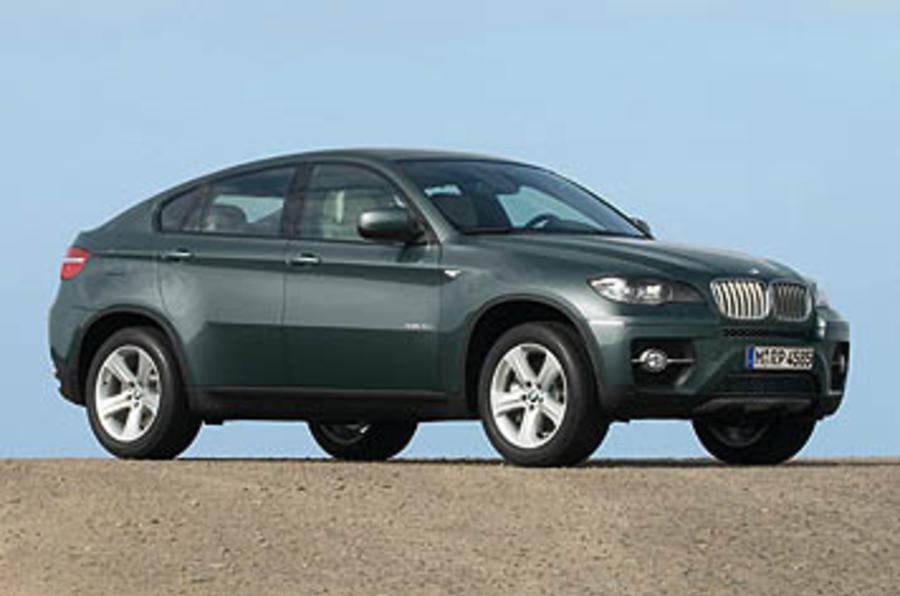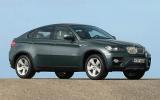What is it?
The most powerful diesel version of the new X6 – BMW’s attempt to cross a sportscar with an off-roader. Put simply, the X6 defies all the well managed marketing logic car makers traditionally pride themselves on.
Most significantly, the X6 acts as a platform for the introduction of some of BMW’s most interesting mechanical developments in years – including a new traction enhancing torque vectoring system that’s set to appear in all of BMW’s four-wheel drive models in future years.
The range-topping diesel version will be far more popular in the UK than the thirsty 50i V8 petrol version. It uses the same 3.0-litre twin-turbocharged diesel engine that has already appeared in the X5, with 286bhp and 427lb ft of torque. It’s not as quick as the petrol V8, but with a 6.9sec 0-62mph time and a 147mph top speed it’s still one of the quickest SUVs yet.
What’s it like?
BMW projects that only 10 per cent of British X6 customers will choose a petrol-powered version, with the two diesel engines constituting the overwhelming majority of sales.
And, on the evidence of the 35d version, it’s not hard to see why – this is a truly amazing powerplant. Peak torque arrives at just 1750rpm and the standard-fit six-speed automatic gearbox provides near-seamless drive. The steering-wheel mounted selection paddles also allow the ‘box to put in a decent impression of a sequential manual if the mood takes you.
Granted, the xDrive35d is 1.5sec shy of its xDrive50i sister in the dash from 0-62mph, but the engine’s massive mid-range urge means nobody is going to notice any real-world deficit. For a car weighing all of 2185kg, the X6 feels both remarkably quick and agile.
Indeed, apart from the elevated driving system – 19mm below that of the X5 but still far taller than conventional cars – the X6 really does deliver on the coupé part of its design brief. It feels like an enormous, tall sportscar, especially with the advanced Dynamic Performance Control torque vectoring system deftly doling out drive to the wheels with the most grip.
It’s surprisingly sensible, too. The combined cycle fuel consumption of 34mpg betters that of the turbocharged V8 by a whopping 11.4mpg. And it manages to avoid the highest band of CO2 taxation too, coming in at 220g/km. Considering the X6’s combination of size and performance, that’s an amazing achievement.
Should I buy one?
The X6 is still a hard car to get your head around, and not everybody will want to. But BMW has succeeded in delivering a car that rewrites the rules on the way an SUV should look and drive – and in xDrive35d guise you can add outstanding performance and economy to the mix.
























Join the debate
Add your comment
Re: BMW X6 xDrive35d
They are the bible, they should know. Funny thing is most people do ignore my posts, so why can't you?
It's Jon by the way.
Re: BMW X6 xDrive35d
I used to set residual values for Motability Operations, Europe's largest fleet with something like 500,000 vehicles (430,000 when I worked there). We had to find a new way to set RVs because CAP and Glass's valuations were so far away from what we were actually achieving that we were literally pouring millions and millions of pounds down the drain each year. Mot Ops took the risk on its entire fleet - ie it owned all of its fleet - and when you find out that the 10,000 Focus's you are going to sell in 2006 are actually worth £500 less per vehicle than what you thought they were going to achieve (at trade auction), the sh!t hits the fan! Focus RVs have always been poor, 3-Series have always been stronger - I'm talking percentage achieved at sale, after front end discount, not the £ figures. Even with the stronger RVs, the Beemers were/are always in greater demand because the dealer mark-up/margins are massive despite the strong RVs. The CAP/Glass's guides might tell you otherwise, but it was gratifying to read James Ruppert's article in Autocar the other week where he said he was ditching the trade guides because their residual value calculations were unrealistic. I've sat in a room with someone right at the top of the tree from CAP who was unable to explain why his company's predictions were so far away from reality. That said I'd take a Focus ST over much of the BMW 3 series range, although I've taken a shine to the look of the Coupe. On the X6 itself, I think the letter in this week's Autocar from 'Jean-Paul Grenade' (great name!) sums things up.
Re: BMW X6 xDrive35d
James, if that is all you came away with from your course, you wasted your time and money. Something many people who don't know about cars do when purchasing a BMW because they have heard they are good cars. I'm not doubting they are good cars by the way. But, given the choice of a Focus over a BMW 3 Series for example, I would have the similarly spec'd Focus every time, why? well in terms of residuals, driver enjoyment, servicing costs, insurance and specification it is damn well near or better than the BMW.
A local BMW dealer has informed me that residuals on 3 series are being hit due to the over selling of what is regarded as a premium car. However the Focus like the Golf still retains it's value very well.